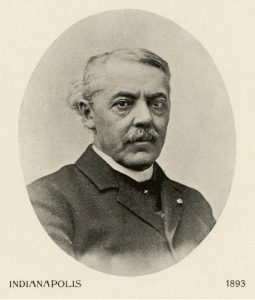
(July 8, 1838-June 6, 1898). Eli Lilly was born in Maryland but soon thereafter moved with his family to Kentucky and then, in 1852, to Greencastle, Indiana. In 1854, he began working at the Good Samaritan Drug Store in Lafayette, learning the business as an apprentice. He returned to Greencastle to open his own drugstore in early 1861. At the same time, he married the daughter of one of the town’s merchants, Emily Lemon, his childhood sweetheart. Their son, , was born November 18, 1861, when Eli was away at war.
Lilly enlisted immediately with the outbreak of the in 1861. He soon organized the Indiana Light Artillery Battery. Composed of Hoosier farm boys, clerks, and college students, the battery members elected Lilly as their captain. As part of John T. Wilder’s Lightning Brigade, they saw action at Hoovers Gap and Chickamauga. Lilly later joined the 18th Indiana Cavalry as a major.
Captured by Confederates, Lilly was sent to a prison camp in Enterprise, Mississippi. He was released in a prisoner exchange in January 1865 and returned to duty. He mustered out at the end of the war as a colonel. As for many others of his generation, his Civil War title stayed with him, used even after his death to distinguish him from his grandson of the same name. In 1893, he served as chairman of the annual encampment, which brought thousands of Union veterans and their families to Indianapolis.
With peace, Lilly tried business in several places, including operating a cotton plantation in Mississippi. It was during this unsuccessful business venture that his wife Emily fell seriously ill while pregnant with their second child. She died on August 20, 1866. The baby also did not survive. Grief-stricken, he returned to Indiana.
In 1868, Lilly filed for bankruptcy. A year later, he married Maria Cynthia Sloan and moved to Paris, Illinois, and a new and more successful drugstore business. Eli had a daughter with Cynthia, Eleanor Wallace Lilly, who was born on January 25, 1871, but died of diphtheria in 1884, a few years before the development of an antitoxin.
Seeking larger opportunities, Lilly returned to Indianapolis and on May 10, 1876, opened a pharmaceutical laboratory on Pearl Street, just off Washington Street. Above the door of the small two-story building, he hung the sign “Eli Lilly, Chemist.” His pills, elixirs, and syrups soon sold well in the city and surrounding towns, and by the late 1880s, the company had become one of the prominent businesses in Indianapolis, with sales exceeding $200,000 (nearly $5.5 million in 2021) and a workforce of 100. Growth brought a move to McCarty Street on the growing industrial southside.
By 1890, Col. Lilly was a wealthy man. Less interested in the pharmaceutical business than civic affairs, he turned over much of the running of the company to his son, Josiah. His civic interests had been apparent as early as the late 1870s when he served as a sponsor for Oscar McCulloch’s . His primary interest was in promoting the economic and general development of the city through commercial organizations. Most notable was the of Indianapolis, of which he was the major founder in 1890 and served as president from 1890 to 1895.
One of the Commercial Club’s first projects was the promotion of a . The organization played a major role in encouraging other civic improvements, particularly sewers and elevated railroad crossings, and generally promoted the economic advantages of the city to outside investors. Lilly’s interest in civic affairs also led to leadership in providing relief for unemployed workers during the harsh depression of 1893.
In 1895, Lilly purchased the home of Walter Q. Gresham, which was located at the corner of North Capitol Avenue and 9th Street. He donated the property to the to establish a children’s hospital in memory of his daughter Eleanor. A forerunner of , the Eleanor Home operated from 1895 to 1909. The facility did not live up to its promise following Lilly’s death and closed due to a lack of funds and deteriorating hygienic conditions.
Lilly became an enthusiastic fisherman and sailor, particularly after he built a family cottage on Lake Wawasee in northern Indiana in 1887, one of the first built there. He also founded the Wawasee Golf Club in 1891. He died of cancer at age 60, one of the most well-known men in the city. His son and two grandsons ( and ) would often refer to the Colonel’s business and civic example as models in their lives.

Help improve this entry
Contribute information, offer corrections, suggest images.
You can also recommend new entries related to this topic.